北师大版八年级英语上册全册教案
北师大版八年级英语上册全册教案
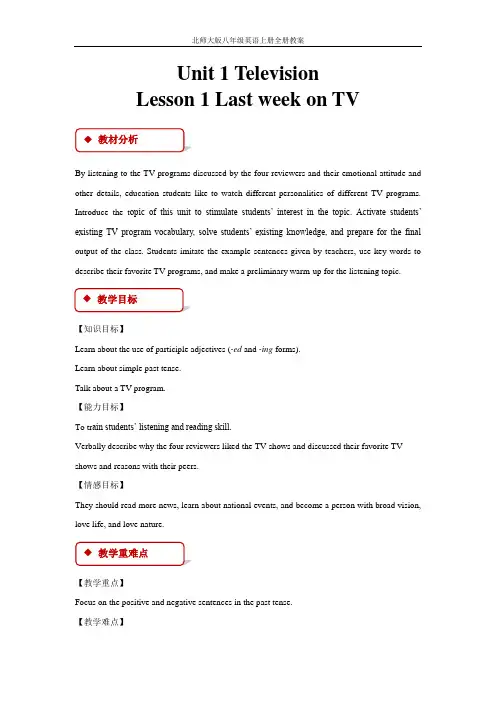
Unit 1 TelevisionLesson 1 Last week on TVBy listening to the TV programs discussed by the four reviewers and their emotional attitude and other details, education students like to watch different personalities of different TV programs. Introduce the t opic of this unit to stimulate students’ interest in the topic. Activate students’ existing TV program vocabulary, solve students’ existing knowledge, and prepare for the final output of the class. Students imitate the example sentences given by teachers, use key words to describe their favorite TV programs, and make a preliminary warm-up for the listening topic.【知识目标】Learn about the use of participle adjectives (-ed and -ing forms).Learn about simple past tense.Talk about a TV program.【能力目标】To tr ain students’ listening and reading skill.Verbally describe why the four reviewers liked the TV shows and discussed their favorite TV shows and reasons with their peers.【情感目标】They should read more news, learn about national events, and become a person with broad vision, love life, and love nature.【教学重点】Focus on the positive and negative sentences in the past tense.【教学难点】Guide students to use the sentence patterns flexibly in activities and life, and cultivate students’ ability to read English.MultimediaStep 1. Warm upIs learning a language difficult?Look at the key words. Listen and read.Key words: Language learningcharacter, conversation, grammar, listening, passage, pronunciation, reading, speaking, vocabulary, writingChoose the correct words to complete the sentences on the right.1. She speaks English very well. Her __________________ is quite good.2. He is learning to write Chinese _________.3. Sometimes ____________________ rules are hard to remember.4. I just read an interesting _________ in an old book.5. We had a long ____________ about the interview on the Internet.Step 2.Discussion1. What do you think is difficult about learning a language?2. Have a discussion with your partner, using the key words.Step 3.Listening1. When did Tina come to Beijing?2. Did Tina like her teacher?What did Tina do in her Chinese class?Listen to the first part of the interview and answer the questions.1. When did Tina come to Beijing?2. Did Tina like her teacher?3. What did Tina do in her Chinese class?Think about the information in the chart.Listen to the second part of the interview and complete the notes about James. James—learning ChineseListen to the whole interview and write Tina, James or Tina &James in each blank.1. ______learned some Chinese from games and TV.2. ______ began learning Chinese at university.3. _____________ think(s) Chinese writing is difficult.4. ______ didn’t speak any Chinese before 2008.Step 4.Grammar一般过去时态:陈述句变一般疑问句1. 当句中含有系动词was/were或情态动词could/would时,把系动词或情态动词提到句首。
北师大版英语八年级上册Unit4Lesson12HealthyBones优秀教学案例
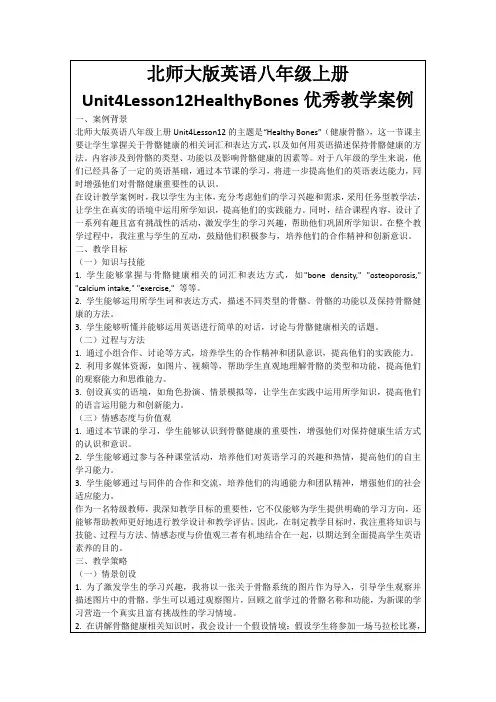
3.在小组活动中,鼓励学生互相交流、分享想法和经验,培养他们的团队合作精神和沟通技巧。
(四)反思与评价
1.课程结束后,引导学生进行自我反思,评估自己在学习过程中的表现。例如,让学生思考:“我在本节课中学到了哪些新知识?我在哪些方面有所提高?我还可以如何在今后的工作中应用这些知识?”等。
(三)情感态度与价值观
1.通过本节课的学习,学生能够认识到骨骼健康的重要性,增强他们对保持健康生活方式的认识和意识。
2.学生能够通过参与各种课堂活动,培养他们对英语学习的兴趣和热情,提高他们的自主学习能力。
3.学生能够通过与同伴的合作和交流,培养他们的沟通能力和团队精神,增强他们的社会适应能力。
作为一名特级教师,我深知教学目标的重要性,它不仅能够为学生提供明确的学习方向,还能够帮助教师更好地进行教学设计和教学评估。因此,在制定教学目标时,我注重将知识与技能、过程与方法、情感态度与价值观三者有机地结合在一起,以期达到全面提高学生英语素养的目的。
3.创设互动情境,如角色扮演、模拟对话等,让学生在具体情境中运用所学知识,提高他们的实践能力。例如,设计一个场景,让学生扮演医生和患者,用英语讨论保持骨骼健康的方法。
(二)问题导向
1.结合课程内容,设计一系列问题,引导学生思考和探究。例如:“骨骼有哪些类型?它们的功能是什么?”、“影响骨骼健康的因素有哪些?”、“如何通过饮食和锻炼来保持骨骼健康?”等。
在设计教学案例时,我以学生为主体,充分考虑他们的学习兴趣和需求,采用任务型教学法,让学生在真实的语境中运用所学知识,提高他们的实践能力。同时,结合课程内容,设计了一系列有趣且富有挑战性的活动,激发学生的学习兴趣,帮助他们巩固所学知识。在整个教学过程中,我注重与学生的互动,鼓励他们积极参与,培养他们的合作精神和创新意识。
北师大版英语八年级上册Unit1Lesson3TheBigGame(第二课时)优秀教学案例
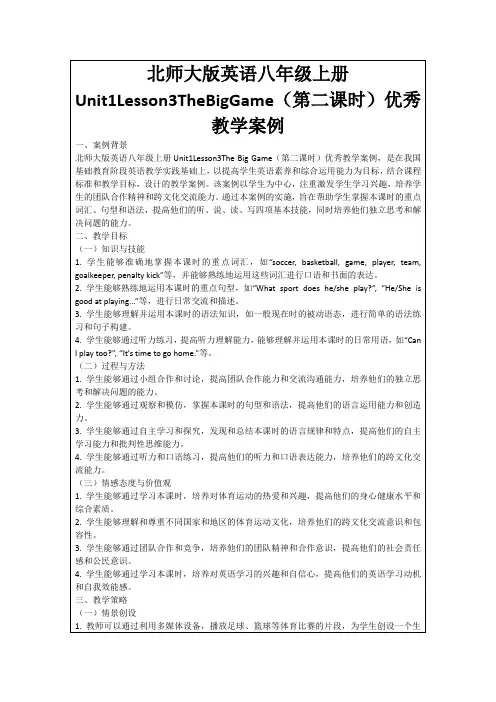
1.教师可以组织学生进行小组讨论和合作,让学生在互动交流中,共同完成任务和学习目标,如分组进行体育项目的比赛,让学生在实践中学习和提高。
2.教师可以设计一些小组探究活动,让学生通过合作探究,发现和解决问题,如小组讨论如何提高体育运动员的体能和技巧。
3.教师可以利用小组合作的机会,培养学生的团队合作精神和沟通能力,如让学生在小组内进行角色分配和协作,共同完成任务。
3.教师可以提醒学生及时总结和反思自己的学习过程和成果,如填写自我评价表,找出自己的优点和不足,为下一步的学习做好准备。通过这样的教学内容与过程,教师可以有效地引导学生学习,激发他们的学习兴趣和积极性,提高他们的英语素养和综合运用能力。
五、案例亮点
1.情景创设丰富多样:本案例通过播放体育比赛视频、设计角色扮演活动等方式,为学生创造了丰富多样的学习情境,使学生在直观、生动的环境中学习英语,提高了学生的学习兴趣和积极性。
三、教学策略
(一)情景创设
1.教师可以通过利用多媒体设备,播放足球、篮球等体育比赛的片段,为学生创设一个生动、直观的学习情境,激发学生的学习兴趣和积极性。
2.教师可以设计一些角色扮演的活动,让学生模拟体育比赛中的场景,如球员、教练、裁判等角色,从而增强学生对体育运动的理解和体验。
3.教师可以利用图片、图表等教学资源,展示不同体育项目的规则和技巧,帮助学生更好地理解和掌握相关知识。
二、教学目标
(一)知识与技能
1.学生能够准确地掌握本课时的重点词汇,如“soccer, basketball, game, player, team, goalkeeper, penalty kick”等,并能够熟练地运用这些词汇进行口语和书面的表达。
2.学生能够熟练地运用本课时的重点句型,如“What sport does he/she play?”, “He/She is good at playing...”等,进行日常交流和描述。
八年级英语北师大版上册册Unit1Lesson1LastWeek(第二课时)教学设计
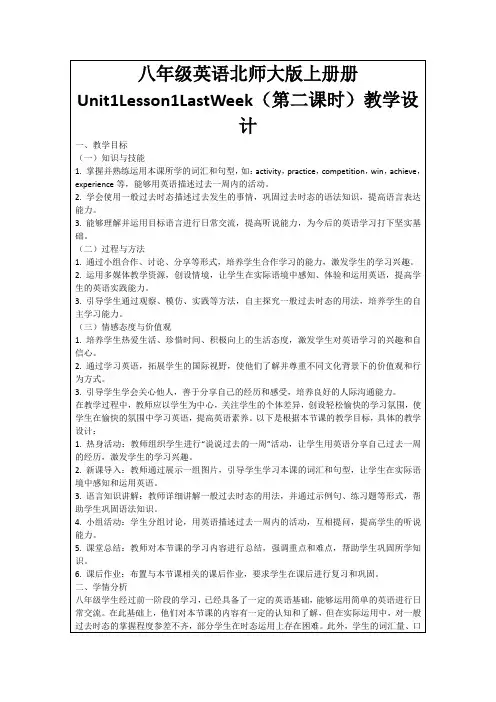
-引入阶段:通过讨论学生过去一周的活动,自然引入本节课的主题,激发学生的兴趣和参与度。
-呈现阶段:利用图片、图表等辅助工具,清晰展示和解释新词汇和句型,帮助学生理解记忆。
-实践阶段:设计一系列互动活动,如对话练习、小组成果展示等,让学生在实践中掌握知识。
-总结阶段:教师引导学生回顾本节课的学习内容,总结一般过去时的用法,巩固学习成果。
八年级英语北师大版上册册Unit1Lesson1LastWeek(第二课时)教学设计
一、教学目标
(一)知识与技能
1.掌握并熟练运用本课所学的词汇和句型,如:activity,practice,competition,win,achieve,experience等,能够用英语描述过去一周内的活动。
2.学会使用一般过去时态描述过去发生的事情,巩固过去时态的语法知识,提高语言表达能力。
难点:如何将新学的词汇和句型融入到日常交流中,做到自然、流畅地表达。
(二)教学设想
1.针对重难点的教学设想:
-利用多媒体教学资源,如动画、故事、歌曲等,帮助学生形象记忆不规则动词的过去式,减少记忆难度。
-设计各种实践活动,如角色扮演、情景模拟等,让学生在实际语境中练习一般过去时的用法,提高他们的语言运用能力。
3.教师挑选几名学生分享他们的周末经历,要求使用一般过去时描述。通过这一环节,让学生感知一般过去时的语意和用法,激发他们对新知识的兴趣。
(二)讲授新知
1.教师通过图片和示例句,呈现本节课的新词汇和句型,如:activity,practice,competition,win,achieve,experience等。引导学生跟读、模仿,确保他们正确掌握单词和句型的发音。
3.教师在批改作业时,要及时反馈,指出学生的错误,并进行有针对性的指导。
北师大版英语八上Unit 1 Lesson 3 The Big Game 教学设计
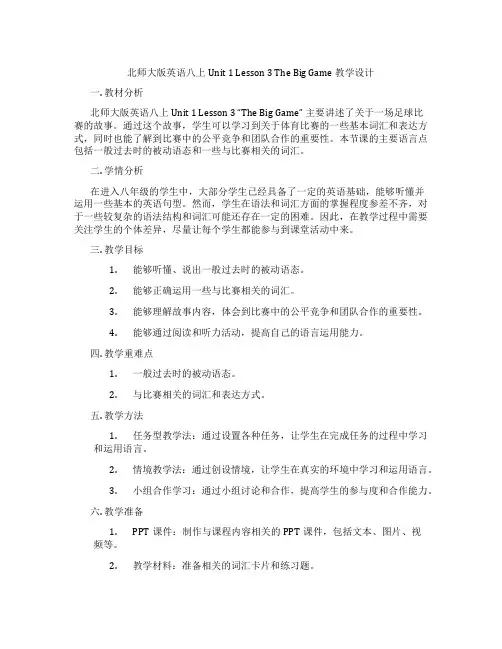
北师大版英语八上Unit 1 Lesson 3 The Big Game 教学设计一. 教材分析北师大版英语八上Unit 1 Lesson 3 “The Big Game” 主要讲述了关于一场足球比赛的故事。
通过这个故事,学生可以学习到关于体育比赛的一些基本词汇和表达方式,同时也能了解到比赛中的公平竞争和团队合作的重要性。
本节课的主要语言点包括一般过去时的被动语态和一些与比赛相关的词汇。
二. 学情分析在进入八年级的学生中,大部分学生已经具备了一定的英语基础,能够听懂并运用一些基本的英语句型。
然而,学生在语法和词汇方面的掌握程度参差不齐,对于一些较复杂的语法结构和词汇可能还存在一定的困难。
因此,在教学过程中需要关注学生的个体差异,尽量让每个学生都能参与到课堂活动中来。
三. 教学目标1.能够听懂、说出一般过去时的被动语态。
2.能够正确运用一些与比赛相关的词汇。
3.能够理解故事内容,体会到比赛中的公平竞争和团队合作的重要性。
4.能够通过阅读和听力活动,提高自己的语言运用能力。
四. 教学重难点1.一般过去时的被动语态。
2.与比赛相关的词汇和表达方式。
五. 教学方法1.任务型教学法:通过设置各种任务,让学生在完成任务的过程中学习和运用语言。
2.情境教学法:通过创设情境,让学生在真实的环境中学习和运用语言。
3.小组合作学习:通过小组讨论和合作,提高学生的参与度和合作能力。
六. 教学准备1.PPT课件:制作与课程内容相关的PPT课件,包括文本、图片、视频等。
2.教学材料:准备相关的词汇卡片和练习题。
3.教学设备:准备电脑、投影仪等教学设备。
七. 教学过程1.导入(5分钟)通过播放一段足球比赛的视频,引起学生的兴趣,然后提问学生他们对足球的了解和喜好。
2.呈现(10分钟)向学生介绍故事的主题和主要人物,然后通过PPT课件呈现故事内容,同时讲解一般过去时的被动语态和与比赛相关的词汇。
3.操练(15分钟)将学生分成小组,每组发一套词汇卡片,让学生通过小组合作的方式,用英语进行卡片游戏,巩固所学的词汇和语法知识。
北师大版初中八年级英语上册全套教案
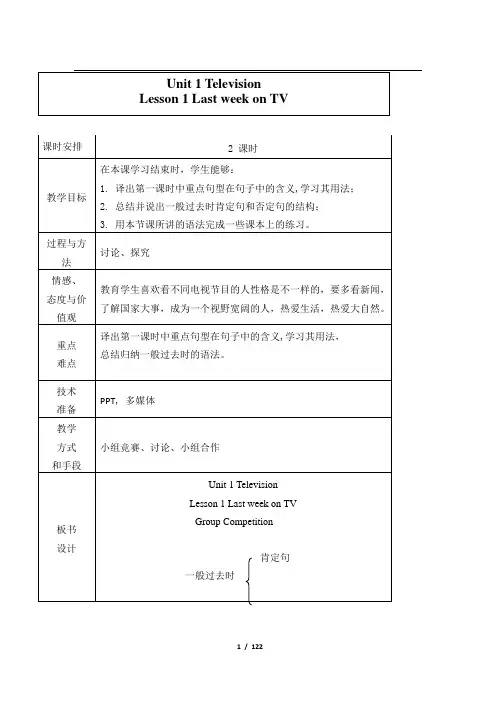
Unit 1 Television Lesson 2 An Interview on TVUnit 1 TelevisionLesson 4 Communication Workshop【教材分析】本单元的话题为电视节目、语言学习经历、体育与赛事。
在本单元第1—3课学生通过阅读和听力活动进行了相关内容的语言学习和初步应用。
前三个输入课的学习,学生通过阅读,获取了上周电视节目和体育与赛事的相关语言信息;通过听力,学习了对Tina和James 的采访,从而了解他们语言学习经历的信息。
在本课,学生要综合使用本单元所获取的有关的词汇和语言信息,以书面形式介绍并评价自己最喜爱电视节目。
此话题贴近学生生活,是学生较为熟悉的话题。
从哪几个方面表达和如何正确运用一般过去时态表达是学生存在困难的地方。
本课的教学设计分为两课时,第一课时学生通过阅读获取与写作相关的语言信息。
引导学生关注文章结构和语言表达,通过小组合作的方式,讨论完善写作提纲。
在第二课时,引导学生进行写作自评和互评,学会欣赏他人作品。
学生根据评价,自己修改文章,完成写作作品。
最后,学生和同伴在写作的基础上,展开关于对喜爱的电视节目的讨论和交流。
【教学内容】话题:电视节目学习内容:阅读Jack的博客获取有关谈论自己喜爱的节目的信息;阅读:通过使用不同的阅读策略,获取文本主要信息,关注文章结构和目标语言;写作:模仿范文结构,列出提纲,进行写作、评价和修改;口语表达:介绍自己最喜爱的电视节目并评价。
【教学目标】在本课学习结束时,学生能够:1. 通过阅读范文,获取有关Jack的最喜爱的电视节目信息;2. 在范文中找出自己写作任务中所需要的内容语言,丰富自己的相关话题的表达语言;3. 分析和归纳范文结构;4. 列出写作提纲。
【教学过程】。
北师大版英语八年级上册Unit1Lesson2AnInterviewonTV(第二课时)优秀教学案例
1.在整个教学过程中,我将提出一系列与电视采访相关的问题,引导学生进行思考和讨论。例如,采访问题的设计原则是什么?如何在采访过程中进行有效的沟通?中西方采访文化有哪些差异?
2.问题导向的教学策略能够激发学生的思维能力,培养他们解决问题的能力,并且能够使学生更加专注和投入于课堂学习中。
(三)小组合作
(二)讲授新知
1.在学生对电视采访有了初步了解后,我将开始正式讲授电视采访的基本知识和技巧。
2.我会通过讲解和示例,向学生介绍采访问题的设计原则、采访过程中的沟通策略、中西方采访文化的差异等核心知识点。
3.同时,我会结合实例和案例,让学生更加直观地理解和掌握电视采访的技巧和方法。
(三)学生小组讨论
1.在讲授完新知识后,我将组织学生进行小组讨论,让学生围绕电视采访的相关话题进行交流和分享。
北师大版英语八年级上册Unit1Lesson2AnInterviewonTV(第二课时)优秀教学案例
一、案例背景
北师大版英语八年级上册Unit1Lesson2《AnInterviewonTV(第二课时)》优秀教学案例,是基于学生在第一课时对电视采访的基本知识和技巧有了初步了解的基础上进行授课。本课时主要引导学生通过观看、分析和实践电视采访,提高学生的听说能力和实际操作能力,培养学生的跨文化交际意识。
(二)过程与方法
1.学生将通过观看、分析和讨论电视采访视频,掌握电视采访的基本知识和技巧。
2.学生将通过小组合作完成一次模拟采访,提高实际操作能力和团队协作能力。
3.学生将通过对比中西方采访文化的差异,增强跨文化交际意识。
(三)情感态度与价值观
1.学生将通过对电视采访的学习和实践,培养对英语学习的兴趣和自信心。
八年级英语北师大版上册册Unit1Lesson3TheBigGame(第二课时)教学设计
1.教学内容:教师呈现课文"The Big Game",引导学生学习生词和短语,如"nerve", "cheer", "goal", "defend", "offense"等。
2.教学方法:采用图片、实物等教学辅助手段,帮助学生理解和记忆新词汇。
3.句子结构:通过课文示例,引导学生学习一般过去时的句子结构,如"The ball hit the back of the net."。
难点:对于学生来说,如何将一般过去时与词汇、短语有效结合,形成流畅的句子和段落是一个挑战。同时,学生在进行角色扮演和口语表达时,如何自然地运用所学知识,克服紧张情绪,提高口语交流能力也是一个难点。
2.重点:提高学生的阅读理解能力,使他们能够从课文中提取关键信息,理解故事的情节和人物的情感。
难点:引导学生从表层理解提升到深层理解,对文章的主旨和作者的观点进行批判性思考,并结合自己的实际经验进行反思。
三、教学重难点和教学设想
(一)教学重难点
1.重点:本节课的重点在于学生对一般过去时的掌握,以及能够运用该时态描述过去发生的体育活动。此外,学生需要掌握相关的词汇和短语,如"nerve", "cheer", "goal", "defend", "offense"等,并能将这些词汇和短语灵活运用于实际对话和写作中。
针对本节课,学生已经在前两节课中学习了关于运动的话题,对本课的主题"The Big Game"有一定的了解。此外,他们对一般过去时的概念已有初步的认识。但在此基础上,如何让学生更好地将所学知识运用到实际情境中,提高他们的语言运用能力,是本节课需要关注的问题。
八年级英语北师大版上册册Unit4Lesson11HealthAdvice(第一课时)优秀教学案例
2.通过提问,激发学生的思考和讨论,引导他们深入思考健康生活的意义和价值,形成自己的观点和见解。
3.设计一些实践性问题,引导学生运用所学知识,给出具体的健1.教师设计一系列问题,引导学生通过小组讨论,就健康生活方式的相关问题进行交流和探讨。
2.学生分组讨论,并在小组内分享自己的观点和见解,形成共同的认知和理解。
3.各小组派代表进行成果展示,其他小组成员进行评价和补充,促进课堂互动和交流。
(四)总结归纳
1.教师引导学生对课堂所学内容进行总结归纳,帮助他们巩固和掌握所学知识。
2.学生通过总结归纳,形成自己对健康生活方式的认识和理解。
3.教师对学生的总结归纳进行点评,关注他们的个体差异,给予个性化的指导和帮助。
(五)作业小结
1.教师设计一个课后作业,让学生结合所学知识,给出自己的健康建议,培养他们学以致用的能力。
2.学生完成作业,并提交给教师,教师对作业进行批改和评价,了解学生的学习情况,为下一步的教学提供参考。
3.学生在作业完成过程中,对课堂所学知识进行复习和巩固,提高学习效果。
五、案例亮点
1.创新的情景创设:本节课通过展示一幅描绘健康生活方式的图片,引发学生对健康生活的思考,激发他们的学习兴趣。这种情景创设在英语教学中是一种创新,有助于提高学生的学习积极性和兴趣,使他们在轻松愉快的氛围中学习英语。
2.问题导向的教学策略:教师设计了一系列问题,引导学生通过阅读理解,获取文章中的关键信息,提高他们的阅读理解能力。问题导向的教学策略有助于培养学生独立思考和解决问题的能力,使他们在学习过程中不断思考、探索和实践。
2.培养学生关爱他人、乐于助人的品质,通过给予健康建议,让他们学会关心他人的生活和健康。
北师大版英语八年级上册Unit1Lesson3TheBigGame(第二课时)教学设计
3.关注个体差异:针对不同学生的语言水平和学习需求,给予个性化的指导,帮助他们克服学习困难。
4.培养合作精神:引导学生学会在团队中合作、互相支持,培养他们的团队意识和集体荣誉感。
5.引导价值观教育:结合课文内容,对学生进行情感态度和价值观的教育,帮助他们树立正确的竞争观念和合作意识。
4.关键词展示:展示本课关键词汇的图片和单词,如“nervous”, “excited”, “scored”, “cheer”等,让学生通过图片猜测单词,为新课的学习打下词汇基础。
(二)讲授新知
1.语言点讲解:结合课文,详细讲解一般过去时的用法,通过例句展示如何描述比赛中的动作和事件。
2.课文阅读:指导学生阅读课文,关注文章中的关键句子和表达方式,如“How did the team feel before the game? What did they do during the game?”。
2.视频引入:播放一段体育比赛的视频,特别是篮球比赛的高潮部分,让学生直观地感受比赛的紧张和激烈,激发他们对新课的兴趣。
3.问题引导:提出问题如“Do you like sports? Have you ever watched a basketball game? How do you feel when you watch a game?”,引导学生思考并交流自己的感受。
6.个性化教学:针对不同学生的学习风格和能力水平,提供差异化教学资源,如词汇卡片、语法图解等,以满足他们的个性化学习需求。
7.作业设计:布置富有创意的作业,如编写比赛小故事、制作比赛海报等,让学生在课后能够继续巩固所学知识,同时激发他们的创造力。
- 1、下载文档前请自行甄别文档内容的完整性,平台不提供额外的编辑、内容补充、找答案等附加服务。
- 2、"仅部分预览"的文档,不可在线预览部分如存在完整性等问题,可反馈申请退款(可完整预览的文档不适用该条件!)。
- 3、如文档侵犯您的权益,请联系客服反馈,我们会尽快为您处理(人工客服工作时间:9:00-18:30)。
Unit 1 TelevisionLesson 1 Last week on TVBy listening to the TV programs discussed by the four reviewers and their emotional attitude and other details, education students like to watch different personalities of different TV programs. Introduce the topic of this unit to stimulate students’interest in the topic. Activate students’existing TV program vocabulary, solve students’existing knowledge, and prepare for the final output of the class. Students imitate the example sentences given by teachers, use key words to describe their favorite TV programs, and make a preliminary warm-up for the listening topic.【知识目标】Learn about the use of participle adjectives (-ed and -ing forms).Learn about simple past tense.Talk about a TV program.【能力目标】To train students’ listening and reading skill.Verbally describe why the four reviewers liked the TV shows and discussed their favorite TV shows and reasons with their peers.【情感目标】They should read more news, learn about national events, and become a person with broad vision, love life, and love nature.【教学重点】Focus on the positive and negative sentences in the past tense.【教学难点】Guide students to use the sentence patterns flexibly in activities and life, and cultivate students’ability to read English.MultimediaStep 1. Warm upIs learning a language difficult?Look at the key words. Listen and read.Key words: Language learningcharacter, conversation, grammar, listening, passage, pronunciation, reading, speaking, vocabulary, writingChoose the correct words to complete the sentences on the right.1. She speaks English very well. Her __________________ is quite good.2. He is learning to write Chinese _________.3. Sometimes ____________________ rules are hard to remember.4. I just read an interesting _________ in an old book.5. We had a long ____________ about the interview on the Internet.Step 2.Discussion1. What do you think is difficult about learning a language?2. Have a discussion with your partner, using the key words.Step 3.Listening1. When did Tina come to Beijing?2. Did Tina like her teacher?What did Tina do in her Chinese class?Listen to the first part of the interview and answer the questions.1. When did Tina come to Beijing?2. Did Tina like her teacher?3. What did Tina do in her Chinese class?Think about the information in the chart.Listen to the second part of the interview and complete the notes about James. James—learning ChineseListen to the whole interview and write Tina, James or Tina &James in each blank.1. ______learned some Chinese from games and TV.2. ______ began learning Chinese at university.3. _____________ think(s) Chinese writing is difficult.4. ______ didn’t speak any Chinese before 2008.Step 4.Grammar一般过去时态:陈述句变一般疑问句1. 当句中含有系动词was/were或情态动词could/would时,把系动词或情态动词提到句首。
I could ride a bike two years ago.Could you ride a bike two years ago?She was at Australia last year.Was she at Australia last year?一般过去时态:陈述句变一般疑问句2. 当句中含有实义动词时,在主语前加助动词did,动词还原成原形。
I got up at 5 o’clock yesterday.Did you get up at 5 o’clock yesterday?Look at the table and circle the correct words.Step 5.Pair workMake yes/no questions about James. Ask and answer in pairs. see a Chinese book in his cousin’s room?learn Chinese in high school?go to university?enjoy his Chinese class?A: Did he see a Chinese book in his cousin’s room?B: Yes, he did.A: Did he learn Chinese in high school?B: No, he didn’t.A: Did he go to university?B: Yes, he did.A: Did he enjoy his Chinese class?B: Yes, he did.Step 6.PracticeWrite wh- questions about the underlined words.Tina came to Beijing in 2008.________________________________________She sometimes played games in Chinese class._________________________________________James went to university in the US._________________________________________James didn’t use Chinese for many years._________________________________________ Brainstorm more wh- questions to ask Tina and James.Why did you want to learn Chinese?Who was your favorite teacher?Step 7.Group workWork in group of three, take turns role-playing Tina, James and the interviewer, asking and answering questions.Step 8.SpeakingWork in pairs. Talk about your own English learning experience.- When did you begin learning English?- What did you do in your English class?- What did you do after class?- What helped you learn English?A: In English class, I usually listen to the teacher carefully.B: Me too. Taking notes is also very important.Step 9.SpeakingA: In English class, I usually listen to the teacher carefully.B: Me too. Taking notes is also very important.Step 10.PronunciationChoose a circle. Guide your partner to it by reading the words aloud.Step 11.Play a game!For example:may, day, tree, try, meStep 12. Homework1. Recite the words and phrases.2. Talk about your English learning experience.略。
